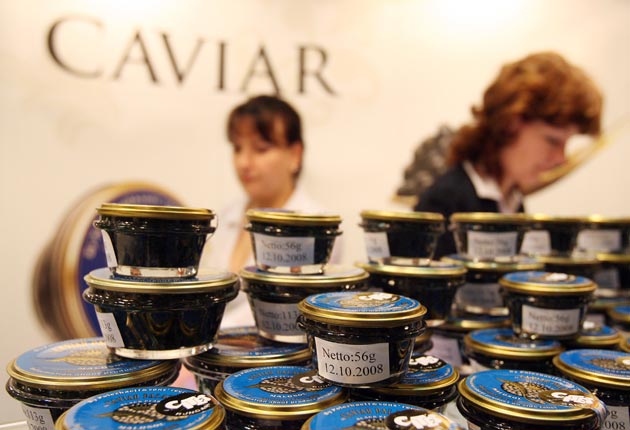Russian caviar goes back on the European menu after nine years

Your support helps us to tell the story
From reproductive rights to climate change to Big Tech, The Independent is on the ground when the story is developing. Whether it's investigating the financials of Elon Musk's pro-Trump PAC or producing our latest documentary, 'The A Word', which shines a light on the American women fighting for reproductive rights, we know how important it is to parse out the facts from the messaging.
At such a critical moment in US history, we need reporters on the ground. Your donation allows us to keep sending journalists to speak to both sides of the story.
The Independent is trusted by Americans across the entire political spectrum. And unlike many other quality news outlets, we choose not to lock Americans out of our reporting and analysis with paywalls. We believe quality journalism should be available to everyone, paid for by those who can afford it.
Your support makes all the difference.Gourmands can rejoice – Russia yesterday lifted a nine-year ban on the export of sturgeon caviar to Europe. However, anyone who is looking forward to snacking on a few blini with beluga will need deep pockets, because the price for the caviar is set to be over £4,000 per kilogram.
Black caviar, the roe of the female sturgeon fish, is one of the world's most prized and expensive food items and is in great demand among millionaires around the world. But it has become scarcer as the population of sturgeon in the Caspian Sea, where most of the fish are found, has shrunk to the brink of extinction. In 2002, Russia halted all exports of caviar.
Now that ban has been lifted and the first shipment to Europe is expected next week. But to begin, exports will be limited to just 150kg a year, Russian fisheries officials said yesterday. The roe will come from fish farmed in new special breeding centres in the south of Russia. In the near future, the Russians hope that farmed sturgeon will produce tons of caviar for the export market. Officials claim that roe from farmed fish tastes just as good as the wild variety.
Russia's top fisheries official, Andrei Krainy, said that the demand in Europe for Russian caviar was limitless. He said: "Retailers know that however much they order, it will all be sold."
Caviar used to be popular in Russia itself, and during the Soviet times was readily available as an affordable luxury. Now sales of caviar from wild sturgeon within Russia are limited to around nine tons per year, with even tiny pots containing just a few mouthfuls going for over £100 in Moscow. Poaching is still widespread, and many Moscow markets offer black-market caviar, with prices starting at around £1,000 per kilogram. In cities on the Caspian Sea, such as Astrakhan, thousands of people make a living through the black-market industry and visitors to local markets are offered black caviar as if they are illegal drugs – with a conspiratorial nudge from stall-holders speaking in hushed voices.
In recent years, the five Caspian Sea countries – Russia, Iran, Kazakhstan, Turkmenistan and Azerbaijan – have mooted a complete ban on fishing in the Caspian, but this has not come into force. Still, the five countries have agreed not to export the roe, as the sturgeon – one of the oldest life forms on the planet – nears extinction due to poaching and overfishing. Wildlife conservationists say only a complete ban on fishing can save the sturgeon.
The sturgeon, which can grow to up to five metres in length and has been around since the time of the dinosaurs, is particularly vulnerable to over fishing. The fish can live for up to 100 years, and can take up to 20 years before they are able to reproduce, meaning that once stocks are depleted it takes a very long time for them to rebound.
Mr Krainy said that the Russians were working on a new law to punish caviar poachers, which would put the crime on the same level as drug trafficking.
Russia has set up a number of fish farms in the south of the country that will soon be able to produce up to 15 tons of caviar a year. The sturgeon at these farms take between five and seven years to mature, and techniques are used that harvest the roe without killing the fish, so the Russians are hoping that there will be a new, sustainable way of producing caviar that will provide more of the "black gold" for the domestic and export markets.
Despite the farms, it is unlikely that the increased production will be enough to bring down prices significantly; it also will fail to deter poachers, who can make thousands of pounds from each sturgeon fish they catch.
"You shouldn't have any illusions about it, black caviar is never going to be cheap. It will always be expensive," Alexander Savelyev, a spokesman for Russia's Federal Fishing Agency, told journalists yesterday.
At the peak of caviar production during the Soviet Union, the country exported up to 1,500 tons a year, so even if the target of 15 tons a year is met, it is clear that demand will still outstrip supply and prices for the luxury item will remain high.
Subscribe to Independent Premium to bookmark this article
Want to bookmark your favourite articles and stories to read or reference later? Start your Independent Premium subscription today.
Join our commenting forum
Join thought-provoking conversations, follow other Independent readers and see their replies
Comments